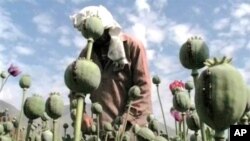Ninety percent of the world's opium poppies are still grown in Afghanistan, concludes the 2010 International Narcotics Control Strategy Report issued by the U.S. Department of State in early March. That's the bad news. The good news is that production has declined by some 36 percent over the past 2 years, and last year 20 provinces were poppy free.
According to the United Nations Office on Drugs and Crime, opium poppy cultivation decreased by nineteen percent in 2008. Last year, better weather resulted in a better yield, so although cultivation of poppies declined by twenty two percent, production of opium gum declined by only another ten percent.
There is a definite connection between narcotics production and trafficking, and regional insecurity. It therefore comes as no surprise that most of Afghanistan's poppy crop is cultivated in 6 provinces in the south and west of the country, where violent insurgents have the greatest presence.
But 2 years ago, the tide began to change. Production in Helmand province, for example, has dramatically decreased thanks to strong efforts taken by the Afghans, combining a program of incentives; better government services; help with growing profitable crops other than poppies; with increased law enforcement.
A heavy presence of illicit drug production and trade is bad news for any country. Like a disease attacking the body, it finds weaknesses within the system and uses them to infect it with corruption. Once it has taken root, drug-engendered corruption spreads rapidly, further weakening the system as it takes over the functions of legitimate government institutions. It brings with it violence and disregard for any needs that do not directly benefit the drug trade. And it benefits no one but those directly involved in, or facilitating the growth and maintenance of, this ugly business.
On every level -- local, district, provincial and national -- the Afghan government is fighting to keep this corruption from entrenching itself within the country. The United States offers support through agricultural and infrastructure development, job creation and banking reform. The U.S. is also helping to root out violent extremism and corruption, and to institute good governance.
Eliminating the cultivation of poppies and trade in opium gum is vital to Afghanistan's ability to establish and maintain an effective government, and thus to be a fully independent, respected member of the community of nations.
Ninety percent of the world's opium poppies are still grown in Afghanistan but production has declined by 36 percent.




